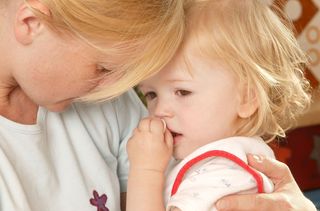Study shows how parents play a big part in children developing empathy early
Here's how you can help your child too...

Parents play a large part in helping children to develop empathy at an early age, according to a new study.
According to the new research, adults who engage with children in social situations can help them to demonstrate empathy earlier than the age of four, which is the age previous studies have suggested children start to display this quality.
Developmental psychologist Elia Psouni and her colleagues at Lund University in Sweden assessed if children aged 33-54 months showed empathy in its simplest form, by determining if the kids could understand that other people may have a false belief about something because they lack information.
As part of the study, the children were asked to predict what would happen next in an illustrated story that was suddenly interrupted.
Researchers were looking to see if the children would predict that the story's main character would make a 'wrong move' because they had a false belief.
They also wanted to see if the kids would be better at doing this with an adult who was busy with another activity, or with an adult engaged in the story with the child.
In the two experiments, the children were shown a film developed by the researchers about little Maxi, whose father moves his favourite toy airplane while Maxi is playing outdoors.
GoodtoKnow Newsletter
Parenting advice, hot topics, best buys and family finance tips delivered straight to your inbox.

When Maxi goes inside to play with his plane, unaware that his dad has moved it, the kids were then asked where Maxi would look for his plane once he discovered it was missing.
Usually children younger than four would answer that Maxi would look for the plane where it actually is, even though Maxi doesn't know that his father moved it.
However, even some of the youngest kids in this study correctly predicted that Maxi would look for the plane in its old location - when they took the test while with an engaged adult.
‘Many children correctly detected and told us about Maxi's false belief, i.e. that Maxi would look for the plane where he actually left it,’ Elia told Science Daily.
‘Surprisingly, these children did not remember the story as a whole better than other children, but specifically noticed and mentioned the fact that daddy moved the toy when Maxi was not there, indicating that they paid closer attention to this particular feature of the story.’
The study shows that children can perceive, understand and reason about other people's perspectives earlier than previously thought.
Kids who answered the question about Maxi while on their own failed at making the correct prediction as often as their peers who took the test but with an unengaged adult, showing how important an adult's attention is, not just their presence.
‘Being in the same room as the child is not enough. It is the active engagement of the adult together with the child that makes the difference,’ Elia added.
A Freelance Writer and Content Editor, Jenni has been working on the women's lifestyle team at TI-Media on and off for over three years. She writes about your favourite celebrities and TV shows so you never miss an update. Jenni also writes beauty news and features - so for all of your skincare and make-up needs, drop her a line.
-
 Compromising may be killing your relationship - here are 5 ways to reach healthy compromises, according to relationship expert
Compromising may be killing your relationship - here are 5 ways to reach healthy compromises, according to relationship expertCompromising isn't always the best way to keep the peace in a relationship
By Charlie Elizabeth Culverhouse Published
-
 Best interactive pets for kids: 15 gift ideas for children of all ages
Best interactive pets for kids: 15 gift ideas for children of all agesFrom puppies to axolotls, take a look at our selection of the best interactive pets you can buy that are sure to be a hit with little animal lovers
By Sarah Handley Published